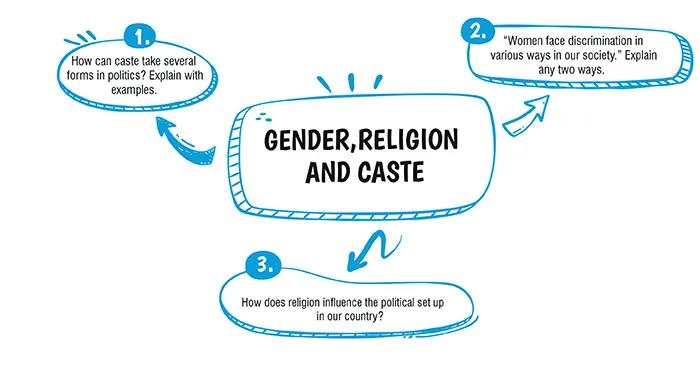Home / Boards / CBSE / Important Questions / Class 10 / Social Science / Gender, Religion and Caste
Table of Contents

Ans. (b)
Explanation:
The Equal Remuneration Act, 1976 provides that equal wages should be paid to equal work.
Ans. (d)
Explanation:
The region with the highest representation of women in their national parliaments is the Nordic countries. This region, consisting of countries such as Sweden, Norway, Finland, Denmark and Iceland.
Explanation:
Caste is considered to be the sole basis of social community. People belonging to the same caste belong to a natural social community and have the same interests which they share amongst themselves and no one else. Caste can take various forms in politics.
(i) Caste composition of an electorate is always kept in mind when the nominations are decided by the party during elections. They tend to nominate candidates of different castes so as to muster necessary support to win elections. When governments are formed, the parties make sure that these candidates of different castes find a place in the set up. Political parties are known to favour some castes and are even recognized as representatives of these castes. This brings prejudice and biases in terms of decisions, ideologies and other such important matters.
(ii) Universal Adult franchise has helped in compelling the political parties to mobilise and have an inclusive approach towards the castes that were earlier ignored by them. However, the inclusion of caste in politics has brought unnecessary violence and controversies. Parties try to favour certain castes and in this way, secure vote banks. Parties also incite people on the pretext of casteism, thus creating political disasters.
Explanation:
There are several ways in which women face discrimination in society:
(i) There is gender bias in society and women are considered fit only for household work which is not right.
(ii) Women are paid less than men, even though both do exactly the same work.
Explanation:
India is a vast country having lots of differences. People are divided on the basis of religion too. Religion influences the political setup in our country. Mahatma Gandhi said. Religion can never be separated from politics” in India. Religion like Hinduism or Islam guides the politics. Religion based politics is not always as dangerous as they look like. The values of religions can play a vital role in politics. India is a democratic country having the followers of each religion who have equal rights and prevents discrimination and oppression for celebrating practice of religion.
| Chapter No. | Chapter Name |
|---|---|
| History | |
| Chapter 1 | The Rise of Nationalism in Europe |
| Chapter 2 | Nationalism in India |
| Chapter 3 | The Making of a Global World |
| Chapter 4 | The Age of Industrialization |
| Chapter 5 | Print Culture and the Modern World |
| Geography | |
| Chapter 6 | Resources and Development |
| Chapter 7 | Forest and Wildlife Resources |
| Chapter 8 | Water Resources |
| Chapter 9 | Agriculture |
| Chapter 10 | Minerals and Energy Resources |
| Chapter 11 | Manufacturing Industries |
| Political Science | |
| Chapter 12 | Power – sharing |
| Chapter 13 | Federalism |
| Chapter 14 | Gender, Religion and Caste |
| Chapter 15 | Political Parties |
| Chapter 16 | Outcomes of Democracy |
| Economics | |
| Chapter 17 | Development |
| Chapter 18 | Sectors of the Indian Economy |
| Chapter 19 | Money and Credit |
| Chapter 20 | Globalization and The Indian Economy |
| Chapter Wise Important Questions for CBSE Board Class 10 Political Science |
|---|
| Power – sharing |
| Federalism |
| Gender, Religion and Caste |
| Political Parties |
| Outcomes of Democracy |
CBSE Important Questions Class 10
ICSE Important Questions Class 10
CBSE Important Questions Class 10
ICSE Important Questions Class 10